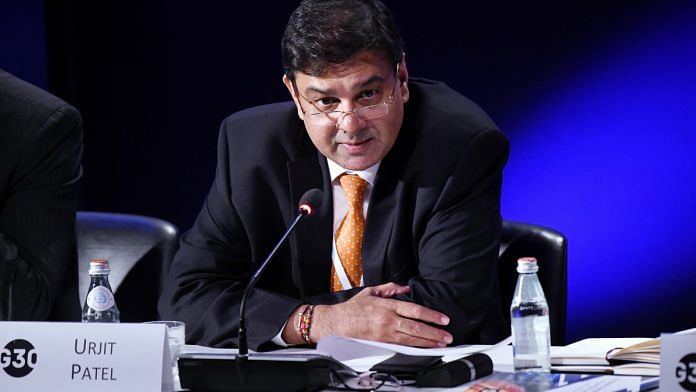New Delhi: The likelihood of pursuing “meaningful privatisation” of banks by any government is “small”, wrote former Reserve Bank of India (RBI) governor Urjit Patel in his book ‘Overdraft’.
In the book released Friday, Patel — who headed the RBI between September 2016 and his unexpected resignation in December 2018 — argued that the government used these banks to pump-prime the economy through loans to borrowers, and is likely to hold on to it.
“As the fiscal elbow room in relation to ambitious expenditure programmes narrows, governments will hold on to GBs (government banks) to keep alive the ‘option value’ of using them for direct stimulus during economic slowdowns,” Patel wrote.
The government is expected to classify banking as a strategic sector and eventually bring down the number of state-run banks in the sector to four as part of its policy to minimise the presence of the public sector.
Patel wrote in his book, published by HarperCollins, on how state-owned banks are used by the government for “day-to-day macroeconomic management”.
He also pointed out how Indian finance ministers declared “credit budgets” on behalf of banks in the annual budget speeches and how state chief ministers announced debt write offs to highlight the use of banks to meet political economy goals.
He also wrote that the temptation to deploy state-run banks for “catalysing aggregate demand has intensified” and pointed out how this bank lending will eventually lead to higher bad debts forcing the government to provide equity.
Patel was also critical of the bank consolidation initiated in 2018, which then continued last year. He pointed out that past experience indicates that the merger of weak banks with a strong bank usually leads to an erosion in value of the latter.
Also read: Modi govt move to ‘dilute’ bankruptcy law led to our rift, RBI ex-governor Urjit Patel says
RBI powers to preserve financial stability diluted
Patel also wrote how the RBI’s de facto powers have been diluted on several matters that are important for preserving financial stability.
“Circulars were reversed and the PCA (prompt corrective action) framework essentially ditched as these came in the way of stimulating the economy through higher credit growth,” he said.
Patel was alluding to the dilution of the rules framed for classification of stressed assets and for placing weak banks under the prompt corrective action framework of banks.
He also reiterated how the central bank has more powers over private banks than government banks with government ownership diluting powers of the central bank in the latter.
He added that private banks are superior to government banks on most counts — productivity, asset quality, return on assets, and return on equity. He also wrote how government ownership undermines normal financial discipline that is “taken for granted in a broadly market-oriented economy”.
The system of dual regulation in government banks has led to fissures in the banking regulatory terrain and this “fault line is bound to lead to tremors,” Patel warned.
Placing government banks under the prompt corrective action framework restricting their lending, lack of RBI’s powers over state-owned banks as well as stringent norms for classification of stressed assets were some of the main points of contention between the government and the RBI when Patel was the governor.
In addition, capital adequacy norms for banks as well as transfer of surplus with the central bank to the government also led to acrimony between the two, leading to the finance ministry threatening to invoke section 7 of the RBI Act to force the regulator to toe its line. Patel eventually quit in December 2018, nine months before his term.
Patel wrote on how the Modi government’s move to dilute the bankruptcy law rather than build on its gains led to a rift between him and the government in 2018.
“Until then, for the most part, the finance minister and I were on the same page…,” he said.
Fiscal stance in India always ‘loose’
Patel pointed out that India’s fiscal stance is always ‘loose’ irrespective of the economic cycle.
“Regardless of where the country stands in the economic cycle, the fiscal tap is hardly ever restrained, that is, fiscal firepower is never kept in reserve for counter-cyclical impetus,” Patel wrote.
Patel was also critical of some of the announcements of the Modi government in the second term, including providing support to over-leveraged real estate projects using State Bank of India and Life Insurance Corporation of India, and the decision to guarantee banks’ purchase of debt of already stressed non-banking finance companies. He pointed out how these do not help in derisking.
Also read: How Urjit Patel spent his last days as RBI governor taking fire from Modi govt




I think it was Robert Kennedy who said::::I believe that, as long as there is plenty, poverty is evil. Guess India has both plenty and poverty too large to measure. Banks will not mean much to growth, private or public.
The less said about Urjit Patel, the better. He was steeped in classical economics with limited grounding in finance. He was always behind the curve and excessively conservative in inflation targeting without understanding fiscal imperatives. His management of banks in India was close to poor. His knowledge of economics and monetary policy was excellent but he remains one of the poorest RBI governors in recent Indian history. Dr Urjit Patel’s views, like his mentor, Dr Raghuram Rajan’s views, can be safely considered biased and consigned to the dustbin of history. I have great respect for their sound economic knowledge and utmost sadness for their imperfections in implementation of RBI’s monetary policy directives. Best wishes. Dr Sandeep Parmar
Given this reality, the way forward would be for the RBI to grant new licences on a continuing basis. Taking exceptional care that these are granted to business groups / entities that have an established track record of integrity. The Indian economy needs a healthier banking system than the one we have.